What Are The Side Effects Of Eating Too Many Grapes?
Beware of the aftermath of overconsuming grapes because too much of anything is bad, they say.

Image: Midjourney/ StyleCraze Design Team
Grapes are widely consumed by many for the benefits they offer, which can be attributed to their high antioxidant, vitamin, and mineral content. But are you aware of the side effects of grapes associated with their overconsumption?
Some such adverse effects include weight gain, stomach upset, and complications during pregnancy.
Learn more about the other potentially negative effects of grapes. Also, read about which drugs can interact with grapes.
 Know The Flip Side: Grapes
Know The Flip Side: GrapesShort-Term Effects
Choking in kids, bloating, allergies, diarrhea
Long-Term Effects
GI tract inflammation, abdominal pain, anaphylaxis, kidney problems
Drug Interactions
It interacts with blood thinners, medicines that treat psychotic disorders, and analgesics.
When To See A Doctor
Consult a doctor if you have allergic reactions like cough, headache, and dry mouth to grapes.
In This Article
How Can Grapes Cause Side Effects?

Grapes are small, and one may ingest too many of them. One full cup (92 grams) of grapes contains over 60 calories (1). The small size of grapes makes it easier to overeat them, and this may add calories. Even red grapes benefits can turn sour if not consumed in moderation.
Eating large portions of grapes regularly may lead to weight gain. Grapes do contain natural sugars like glucose and fructose, which can cause a spike in blood sugar levels if consumed in large quantities. This is especially true if one has high blood sugar and doesn’t consciously watch what they eat every day.
Like most fruits, grapes also contain fiber. Consuming excess fiber could lead to constipation (2).
 Fun Fact
Fun FactGrapes are believed to be one of the oldest cultivations grown as far back as 6500 BC, in the Neolithic era.
Most of the ill effects of grapes have to do with their excess intake. Though the side effects are not common, it is important you know about them.
What Are The Side Effects Of Grapes?
The salicylic acid in grapes can cause digestive problems. This happens if you overeat grapes. Eating too many grapes in a day may also lead to diarrhea. Additionally, its by-products may also share the same adverse effects. For example, the grape seed extract side effects can cause allergic reactions or interactions with certain medications. Weight gain over time is another possible side effect of excess intake of grapes.
1. May Cause Stomach Upset

Grapes contain salicylic acid. Some research highlights an intolerance to this acid, which is characterized by local inflammation of the gastrointestinal tract, abdominal pain, diarrhea, and bloating (3).
Jesse Feder, RDN, says, “Grapes are typically safe regarding acid reflux; however, it is best to avoid sour grapes or grapes that are not very ripe as these have higher acidity.”
In some studies, individuals who had eaten grape seeds experienced appendicitis (4). Undigested seeds or the residue of fruits may also cause acute stomach pain. However, more research is warranted in this regard.
Grapes may also cause problems if you have irritable bowel syndrome. IBS is a gastrointestinal disorder marked by continuous stomach issues like gas, bloating, nausea, fatigue, and difficult bowel movements. Grapes contain insoluble fiber that could stimulate the gastrointestinal tract (5). If you have IBS, ensure you do not eat them on an empty stomach. You can also face these issues if you have overindulged in dry grapes.
If you have indigestion or an upset stomach, consuming ginger juice might help. Ginger also helps relieve nausea, especially in the case of pregnancy or other treatments like chemotherapy (6).
2. May Result In Diarrhea

Foods high in sugar may cause diarrhea. Some research shows that sugar alcohols, organic compounds found in sugar, may lead to diarrhea (7). However, there is insufficient evidence to prove if grapes contain sugar alcohols.
Grape juice may cause diarrhea in susceptible individuals as it contains simple sugars (8).
Some believe grapes may also cause traveler’s diarrhea. This is the form of diarrhea you contract when you visit a different place where the food or sanitary practices are different from where you live. Unpeeled fruits are usually known to cause this form of diarrhea (9).
Traveler’s diarrhea can be problematic as you are away from home. You can cut down this risk by taking drugs like loperamide that can help treat the symptoms of diarrhea (10). However, if you feel any nausea, vomiting, dizziness, headaches, or fatigue, this could be a side effect of the drug. Do check with your pharmacist or doctor for the ideal dosage.
Anecdotal evidence suggests that this medication may not be safe for
pregnant women and children under 3 years of age. Consult a doctor for more information.
3. May Lead To Weight Gain

Eating too many grapes in one sitting can make the calories add up quickly. Grapes are high in calories (1). Though there is no research that eating too many grapes could lead to weight gain, binging on them could increase the risk.
Also, you may want to reduce the intake of grapes as a snack. Grapes are lower in calories when compared to cookies and granola bars, but overeating them may lead to weight gain in the long run.
Go for fresh grapes over canned varieties. Canned grapes contain twice as much sugar, and they could contribute to faster weight gain.
The idea that grapes may cause weight gain is not yet validated by research. However, it could be logical to assume that one may overeat grapes as they are small. Make grapes a part of your daily diet – but be wary of the portion sizes (8 to 10 grapes a day should do).
4. May Cause Complications During Pregnancy
This adverse effect can be attributed to the resveratrol in grapes, which is a powerful polyphenol also found in red wine.
In a study, resveratrol supplements were found to cause pancreatic problems in the developing fetus. Though the study doesn’t state anything against grapes, it is better to exercise caution (11).
Some preliminary studies have shown that resveratrol supplementation could actually be beneficial during pregnancy (12). But by and large, studies are inconclusive. Please check with your doctor before taking grapes during pregnancy.
5. May Cause Choking In Kids

Choking in kids is a prevalent problem. Uncut fruits/vegetables usually can cause choking in kids, especially in those between 6 to 12 months of age. The same could be the case with grapes. This is the period when kids learn to chew and swallow food (13).
Uncut grapes are the problem. Ensure you give your toddler cut grapes to prevent choking.
The reason grapes are one of the few foods that pose a high risk is their size and shape. A grape has near-perfect dimensions to block a child’s airways. If a child is choking, the following pointers can help (14):
- If you can see the grape, try removing it with your fingers. Do not blindly poke fingers as you might end up pushing the grape further in. This may make things worse.
- If you cannot see the fruit and your child is silent or not coughing effectively, please call for help.
- If your child is conscious but still struggling, try giving back blows. You can do this by laying your child face down along your thighs. Support their head with your hand. Give about five sharp back blows with the heel of your hand in the middle of the back (between the shoulder blades).
This quick video tutorial will help.
6. May Cause Allergies

Although grape allergy is rare, it can be problematic. The allergic reactions range from minor skin irritation to severe anaphylaxis. A specific protein in grapes, called the grape lipid transfer protein, is found to cause severe allergic reactions in individuals (15).
Though only a small percentage of people are allergic to them, grapes can also cause anaphylaxis, which can be life-threatening (16).
Another study reports the case of an 18-year-old female student-developed itching, rashes, and facial swelling after eating grapes (17).
Salicylates are compounds found in most fruits and vegetables, including grapes. Most grape allergies are not life-threatening, except for anaphylaxis.
Anaphylaxis occurs by the release of histamine and other chemicals in the body. This results in leaky blood vessels, eventually leading to the swelling of tissues in the mouth and airways (and dangerously low levels of blood pressure too) (18).
The best-known treatment for anaphylaxis is epinephrine administration. Epinephrine is a chemical in the body that elevates heart rate, and may elevate blood pressure (19).
You can purchase epinephrine from your nearest pharmacy as a pre-filled syringe. It can be immediately injected into the thigh muscle once the symptoms of anaphylaxis are recognized (19).
If you are susceptible to such allergic reactions, keeping an epinephrine injection handy can help.
7. May Aggravate Kidney Problems
Studies have shown acute renal failure in dogs after the ingestion of grapes. After consuming grapes, dogs were reported to have vomited. They also had experienced anorexia (loss of appetite), lethargy, and diarrhea (20).
A report by the National Institute of Diabetes and Digestive and Kidney Diseases suggests that individuals with advanced chronic kidney disease and diabetes limit their intake of certain foods, including grapes (21). Another study suggests limiting the intake of concord grapes in those with kidney stones due to their high oxalate content (22). Though it is safe for most people, those who already have kidney stones should avoid them.
Though no studies have directly linked grapes to adverse kidney effects in humans, you need to exercise caution. If you have any form of kidney ailment, please keep away from grapes and talk to your doctor.
8. May Cause Cough, Headache, And Dry Mouth
Anecdotal evidence suggests that excess intake of grapes may lead to scratchiness or mild itchiness in the back of your throat or the roof of your mouth. This may be accompanied by a cough or sore throat in some cases.A study has recognized grapes as one of the foods that may trigger migraine or headaches in some people (23).You may also experience dryness or a grainy sensation in your mouth. This is caused by the presence of grape tannins, which may interact with the proteins in the saliva. The proteins and tannins clump together and precipitate, decreasing saliva’s lubricity and increasing oral cavity friction (24).
In addition to these side effects, consuming grapes at night may cause a few complications.
Side Effects Of Eating Grapes At Night
- Sleep Disruption: Consuming grapes before bedtime may disrupt sleep, causing blood sugar spikes due to their natural sugar content.
- Digestive Discomfort: Since the digestive system slows down during sleep, it becomes harder to process the sugar and fiber content in grapes.
- Weight Gain: Overindulging in grapes at night may contribute to weight gain, as excess sugar can be stored as fat.
- Acid Reflux: Grapes may trigger acid reflux, especially when lying down, resulting in discomfort and sleep disturbances.
- Dental Issues: Unremoved grape residues may lead to tooth decay and bad dental health.
As discussed, grapes are generally safe. They are also incredibly nutritious. But it is important to know the ill effects they can cause. These fruits can also interact with certain drugs. If you are on any form of medication, you should be careful.
 Fun Fact
Fun FactDo Grapes Interact With Any Drugs?
Grapes can interact with the following drugs (25), (26):
- Haldol
- Phenacetin
- Coumadin
This list includes drugs that are broken down by the liver. People who are using blood thinners must avoid excess intake of grapes (occasional intake, in moderation, could be safe) (25), (26), (27). If you are taking any such drugs, you should check with your doctor before consuming grapes.
Grapes are a delicious and healthy snack, but did you know they can have unexpected side effects? Learn more in this video about the healthy alternatives to eating grapes.
Infographic: Unexpected Side Effects Of Eating Too Many Grapes
Grapes are better known for their taste and presence of rich antioxidant content. Even though green grapes benefit your health in various ways, they should be consumed in moderation. However, excess eating may lead to several side effects. Check out the infographic below to learn about the unexpected side effects of eating too many grapes. Illustration: StyleCraze Design Team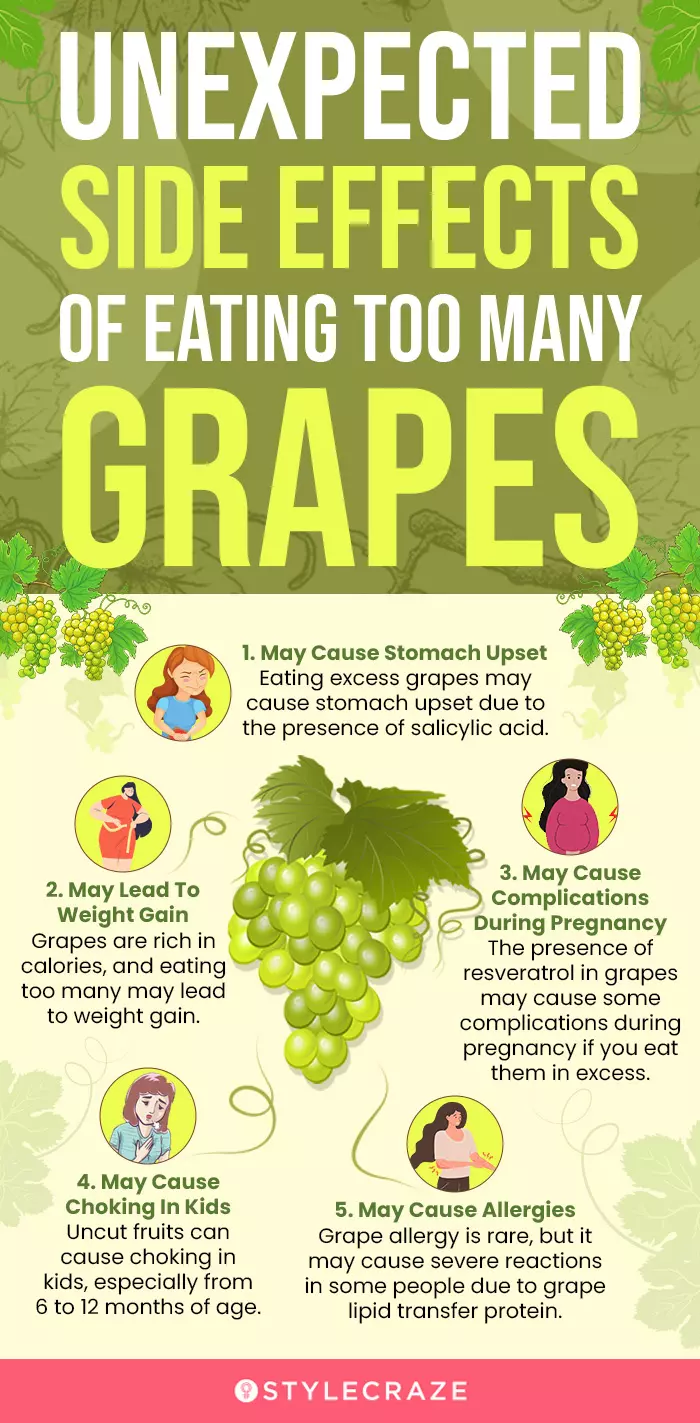
Grapes are delicious fruits with a high antioxidant profile. The powerful plant compounds in grapes offer several health benefits. However, excess intake of grapes may cause side effects. These include an upset stomach, diarrhea, weight gain, complications during pregnancy, choking in kids, and allergies. They may also aggravate kidney problems and interact with some drugs. Though they make a healthy addition to your diet, consume them in moderation to avoid any adverse reactions.
Frequently Asked Questions
Do grapes increase breast feed?
Jesse Feder, RDN, says, “Specific research on grapes and breastfeeding is limited. However, it has been shown that fruit consumption is essential to having healthy breast milk for the baby.”
Are grapes good for heart disease?
According to Jesse Feder, RDN, “Grapes can be a great addition to a healthy diet and are good for people with heart disease. They are rich in fiber and antioxidants, as well as specific compounds that are thought to reduce bad cholesterol. This can help people reduce their chances of having adverse effects from heart disease or prevent it altogether.”
How many grapes can you eat in a day?
About 32 grapes can be considered as one serving. Eating one serving is okay if you are already on a healthy diet and physically active. But otherwise, stick to 8 to 10 grapes a day.
Can you eat grapes at night?
Yes, you can. In fact, eating grapes at night might promote better sleep. Grapes contain melatonin, the sleep hormone (28).
Can I eat grapes on an empty stomach?
You may have them on an empty stomach. Grapes are rich in nutrients and antioxidants and low in glycemic index.
What happens if you eat grapes every day?
Grapes offer numerous health benefits due to their exceptional nutrient and antioxidant content. They may be beneficial to the eyes, heart, bones, and other organs. Just remember to limit yourself to eating no more than one cup of grapes per day.
What is better – green grapes or red grapes?
Red and green grapes are both excellent in their own ways. However, some types of red or black grapes contain more antioxidants than green grapes.
Are grapes a laxative?
Yes, grapes have long been used as a laxative food due to the type of insoluble fiber, antioxidants, and high water content they have.
Key Takeaways
- Grape seeds contain cyanide, which can be hazardous if consumed in high doses.
- Histamines, which can cause allergic reactions in some people, are present in grapes.
- Grapes can increase tooth decay.
- Some people may be allergic to salicylates, which are present in grapes.
- If grapes are not thoroughly cleaned before consumption, the pesticides and fungicides employed on them may have harmful effects on health.
References
Articles on StyleCraze are backed by verified information from peer-reviewed and academic research papers, reputed organizations, research institutions, and medical associations to ensure accuracy and relevance. Read our editorial policy to learn more.
- Grapes, american type (slip skin), raw, United States Department of Agriculture, National Nutrient Database.
https://fdc.nal.usda.gov/fdc-app.html#/?query=ndbNumber:9131 - Stopping or reducing dietary fiber intake reduces constipation and its associated symptoms, World Journal of Gastroenterology, US National Library of Medicine, National Institutes of Health.
https://www.ncbi.nlm.nih.gov/pmc/articles/PMC3435786/ - Bioactive food chemicals and gastrointestinal symptoms: a focus of salicylates, Journal of Gastroenterology and Hepatology, Online Wiley Library.
https://onlinelibrary.wiley.com/doi/full/10.1111/jgh.13702#jgh13702-sec-0005-title - Can fruit seeds and undigested plant residuals cause acute appendicitis, Asian Pacific Journal of Tropical Biomedicine, US National Library of Medicine, National Institutes of Health.
https://www.ncbi.nlm.nih.gov/pmc/articles/PMC3609170/ - A nutritional approach for managing Irritable Bowel Syndrome, Current Opinion in Pediatrics, US National Library of Medicine, National Institutes of Health.
https://www.ncbi.nlm.nih.gov/pmc/articles/PMC5777282/ - The Effectiveness of Ginger in the Prevention of Nausea and Vomiting during Pregnancy and Chemotherapy, Integrative Medicine Insights, US National Library of Medicine, National Institutes of Health.
https://www.ncbi.nlm.nih.gov/pmc/articles/PMC4818021/ - Gastrointestinal Disturbances Associated with the Consumption of Sugar Alcohols with Special Consideration of Xylitol: Scientific Review and Instructions for Dentists and Other Health-Care Professionals, International Journal of Dentistry, ResearchGate.
https://www.researchgate.net/publication/309324855_Gastrointestinal_Disturbances_Associated_with_the_Consumption_of_Sugar_Alcohols_with_Special_Consideration_of_Xylitol_Scientific_Review_and_Instructions_for_Dentists_and_Other_Health-Care_Professional - Fruit juice malabsorption: not only fructose, Acta Paediatrica, US National Library of Medicine, National Institutes of Health.
https://pubmed.ncbi.nlm.nih.gov/8580619/ - Prevention and Self-Treatment of Traveler’s Diarrhea, clinical Microbiology Reviews, US National Library of Medicine, National Institutes of Health.
https://www.ncbi.nlm.nih.gov/pmc/articles/PMC1539099/ - “Loperamide: a new antidiarrheal agent in the treatment of chronic diarrhea”, National Library of Medicine.
https://pubmed.ncbi.nlm.nih.gov/773735/ - Beneficial and cautionary outcomes of resveratrol supplementation in pregnant nonhuman primates, The FASEB Journal, US National Library of Medicine, National Institutes of Health.
https://www.ncbi.nlm.nih.gov/pmc/articles/PMC4021444/ - Maternal resveratrol consumption and its programming effects on metabolic health in offspring mechanisms and potential implications, Bioscience Reports, US National Library of Medicine, National Institutes of Health.
https://www.ncbi.nlm.nih.gov/pmc/articles/PMC5843748/ - Choking Hazards, Centers for Disease Control and Prevention.
https://www.cdc.gov/nutrition/infantandtoddlernutrition/foods-and-drinks/choking-hazards.html - The choking hazard of grapes: a plea for awareness, Archives of Disease in Childhood, US National Library of Medicine, National Institutes of Health.
https://pubmed.ncbi.nlm.nih.gov/27998886/ - Severe immediate allergic reactions to grapes: part of a lipid transfer protein-associated clinical syndrome, International Archives of Allergy and Immunology, US National Library of Medicine, National Institutes of Health.
https://pubmed.ncbi.nlm.nih.gov/17228170/ - Grape anaphylaxis: a study of 11 adult onset cases, Allergy and Asthma Proceedings, US National Library of Medicine, National Institutes of Health.
https://pubmed.ncbi.nlm.nih.gov/15813289/ - Simultaneous Allergy to Vine Pollen and Grape, Journal of Investigational Allergology and Clinical Immunology, US National Library of Medicine, National Institutes of Health.
https://pubmed.ncbi.nlm.nih.gov/16889288// - Epidemiology, Mechanisms, and Diagnosis of Drug-Induced Anaphylaxis, Frontiers in Immunology, US National Library of Medicine, National Institutes of Health.
https://www.ncbi.nlm.nih.gov/pmc/articles/PMC5446992/ - Safety of epinephrine for anaphylaxis in the emergency setting, World Journal of Emergency Medicine, US National Library of Medicine, National Institutes of Health.
https://www.ncbi.nlm.nih.gov/pmc/articles/PMC4129903/ - Acute renal failure in dogs after the ingestion of grapes or raisins: a retrospective evaluation of 43 dogs (1992-2002), Journal of Veterinary Internal Medicine, US National Library of Medicine, National Institutes of Health.
https://pubmed.ncbi.nlm.nih.gov/16231710/ - Heart disease & kidney disease National Institute of Diabetes and Digestive and Kidney Diseases.
https://www.niddk.nih.gov/health-information/kidney-disease/heart-disease - Nutritional Management of Kidney Stones (Nephrolithiasis)
https://www.ncbi.nlm.nih.gov/pmc/articles/PMC4525130/ - Watermelon and others plant foods that trigger headache in migraine patients
https://pubmed.ncbi.nlm.nih.gov/33892616/ - Wine and Grape Tannin Interactions with Salivary Proteins and Their Impact on Astringency: A Review of Current Research
https://www.ncbi.nlm.nih.gov/pmc/articles/PMC6259628/ - Possible Enhancement of the First-Pass Metabolism of Phenacetin by Ingestion of Grape Juice in Chinese Subjects British Journal of Clinical Pharmacology US National Library of Medicine National Institutes of Health.
https://pubmed.ncbi.nlm.nih.gov/10583039/// - Interaction of Flurbiprofen With Cranberry Juice Grape Juice Tea and Fluconazole: In Vitro and Clinical Studies Clinical Pharmacology and Therapeutics US National Library of Medicine National Institutes of Health.
https://pubmed.ncbi.nlm.nih.gov/16413247/// - Clinical nutrition and drug interactions Turkish Journal of Surgery US National Library of Medicine National Institutes of Health.
https://www.ncbi.nlm.nih.gov/pmc/articles/PMC4382818/ - Dietary Sources and Bioactivities of Melatonin Nutrients US National Library of Medicine National Institutes of Health.
https://www.ncbi.nlm.nih.gov/pmc/articles/PMC5409706/
Read full bio of Madhu Sharma
- Jesse Feder, RDN/LDN, is a Clinical Dietitian at the Memorial Regional Hospital. He is also a certified by the American College of Sports Medicine as a personal trainer (ACSM-CPT) and the National Strength and Conditioning Association as a Certified Strength and Conditioning Specialist (NSCA-CSCS).
 Jesse Feder, RDN/LDN, is a Clinical Dietitian at the Memorial Regional Hospital. He is also a certified by the American College of Sports Medicine as a personal trainer (ACSM-CPT) and the National Strength and Conditioning Association as a Certified Strength and Conditioning Specialist (NSCA-CSCS).
Jesse Feder, RDN/LDN, is a Clinical Dietitian at the Memorial Regional Hospital. He is also a certified by the American College of Sports Medicine as a personal trainer (ACSM-CPT) and the National Strength and Conditioning Association as a Certified Strength and Conditioning Specialist (NSCA-CSCS).
Read full bio of Arshiya Syeda
Read full bio of Sindhu Koganti





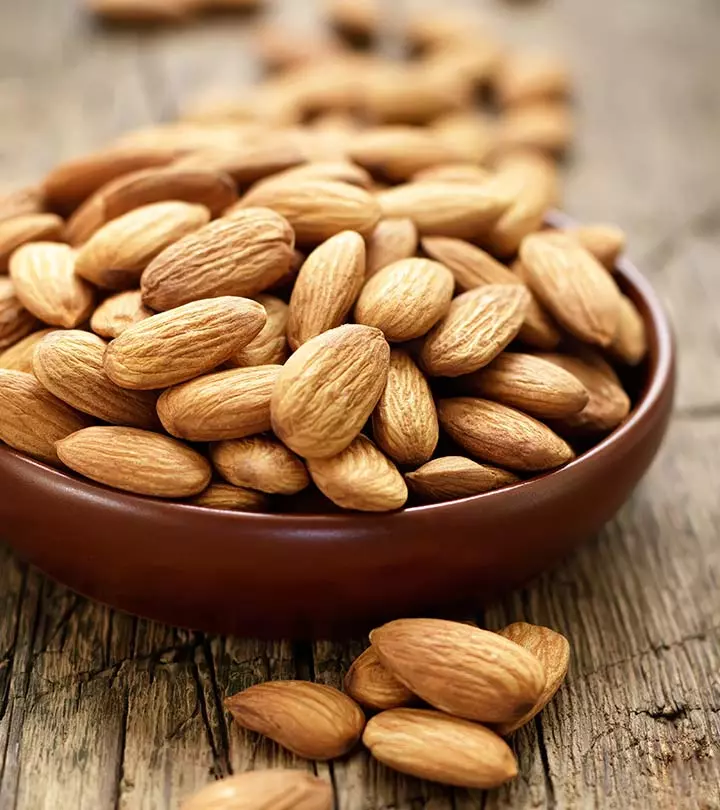
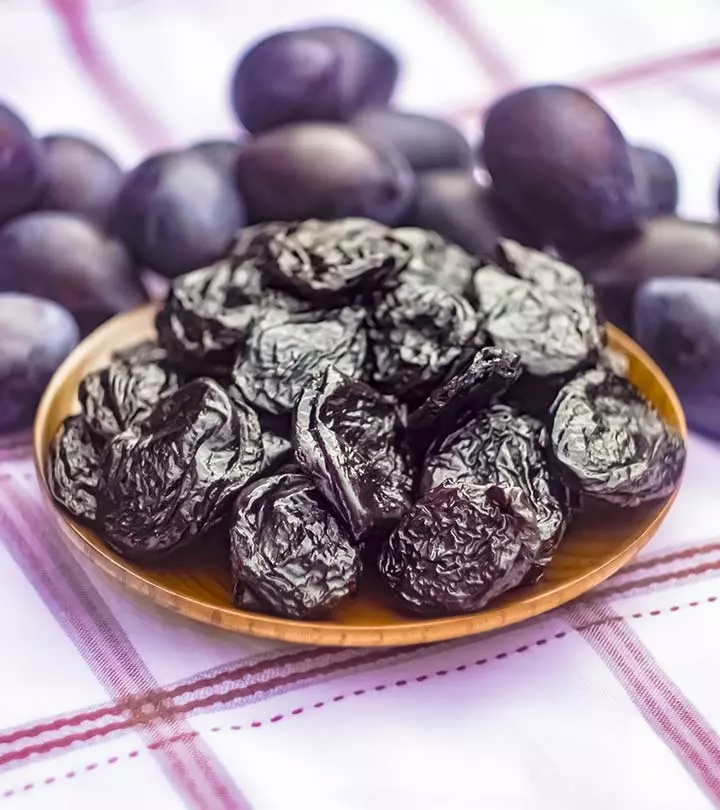
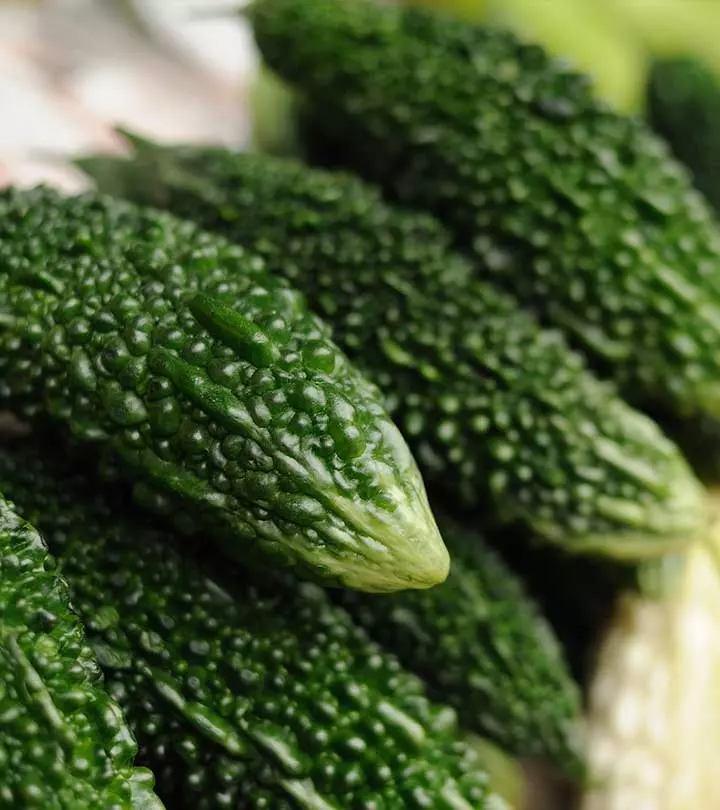
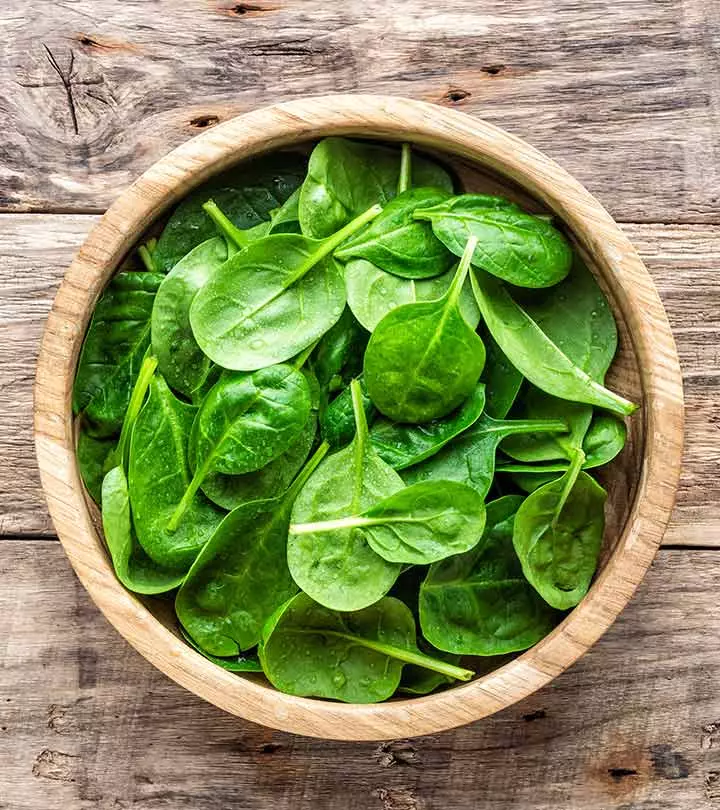
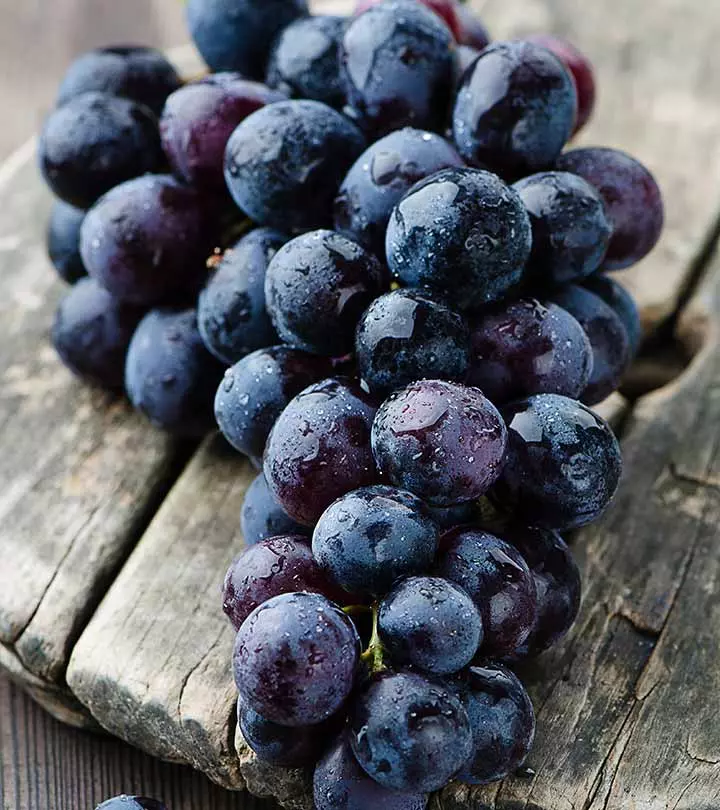
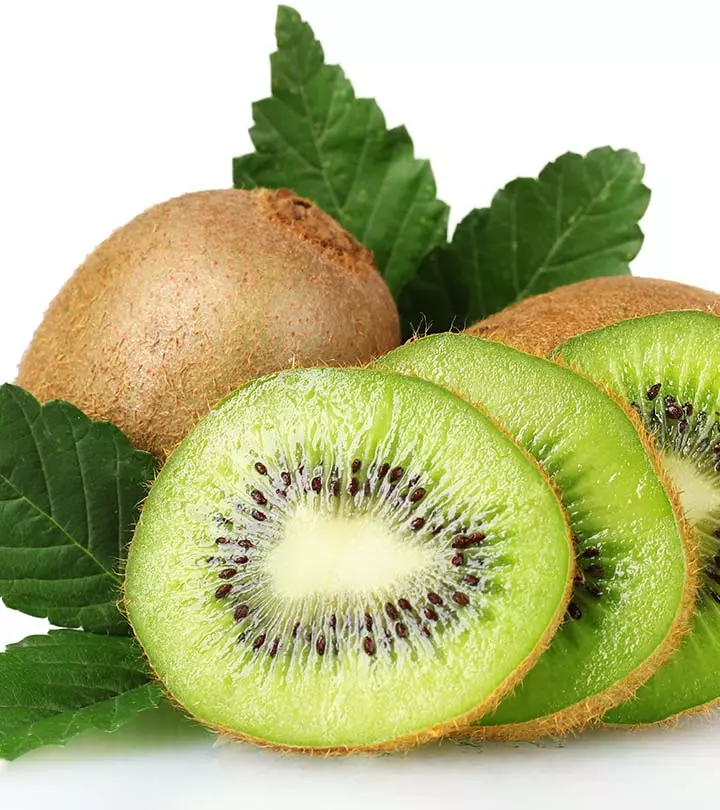
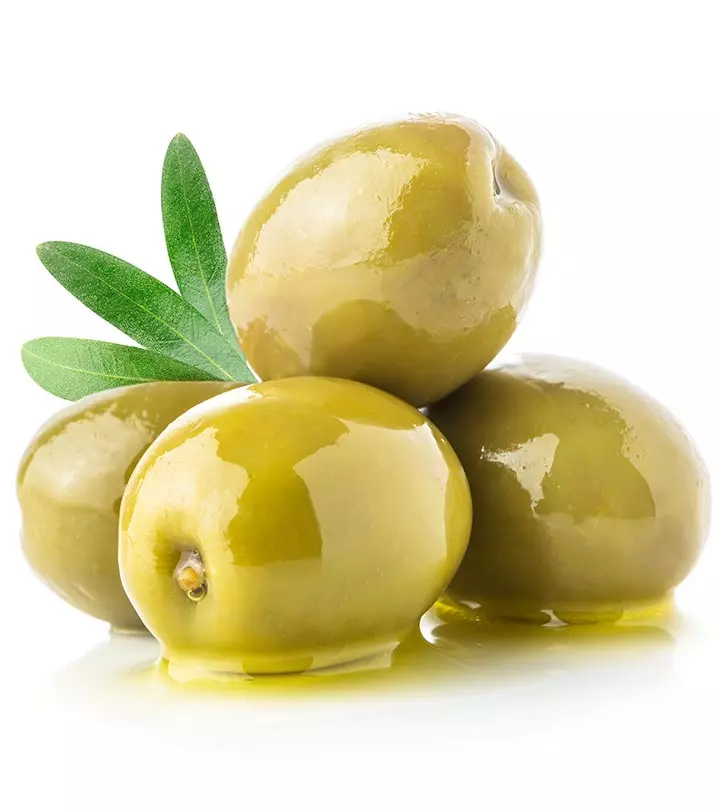
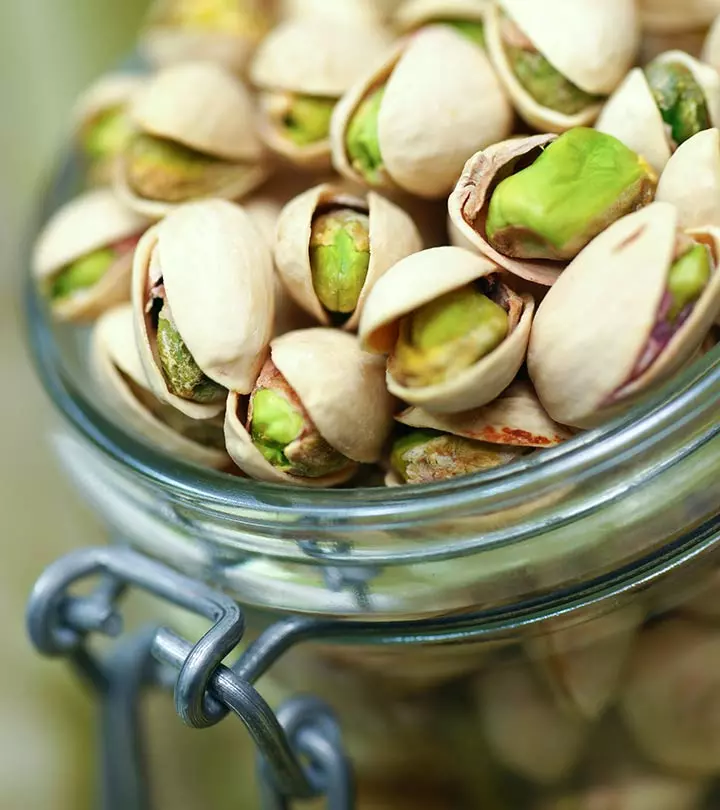
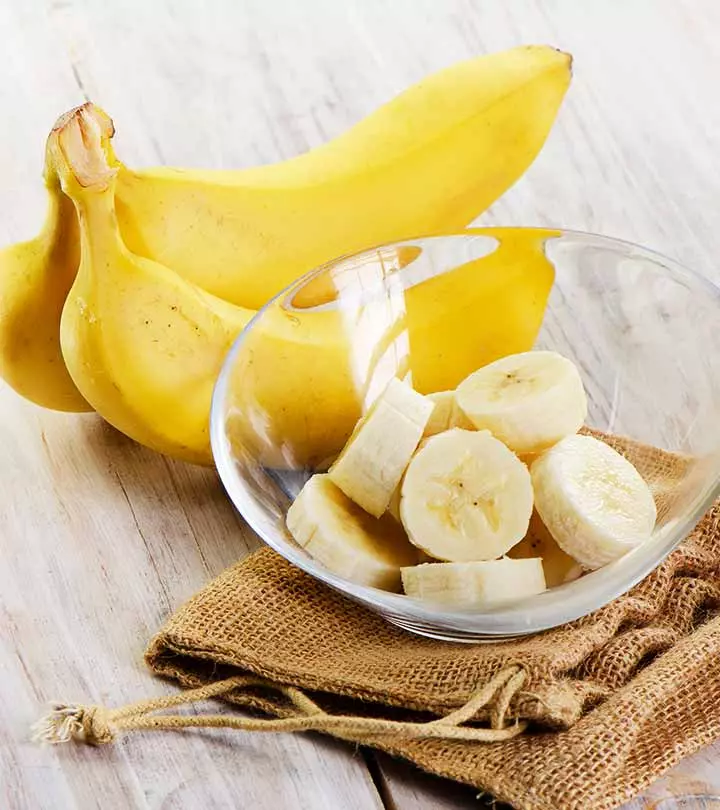
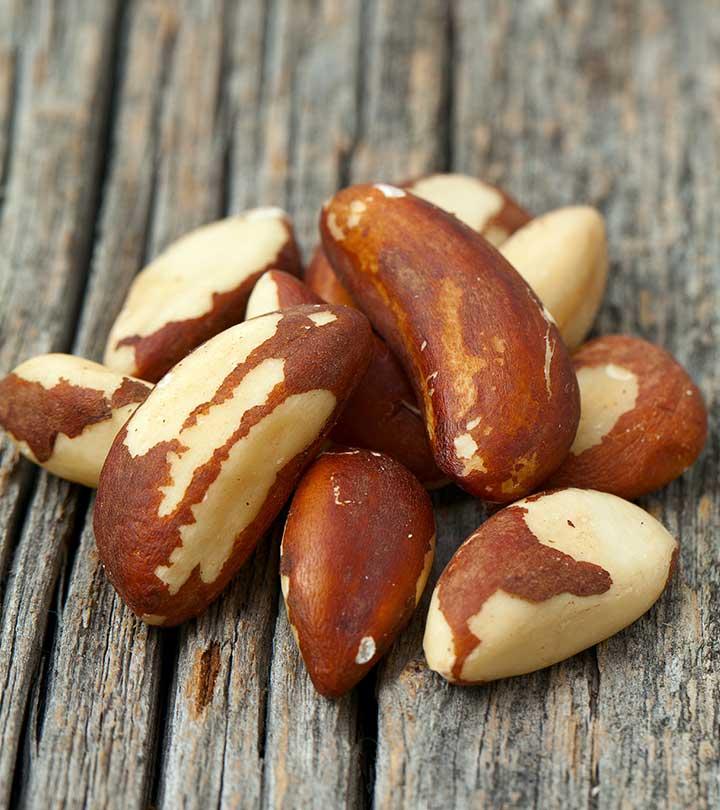



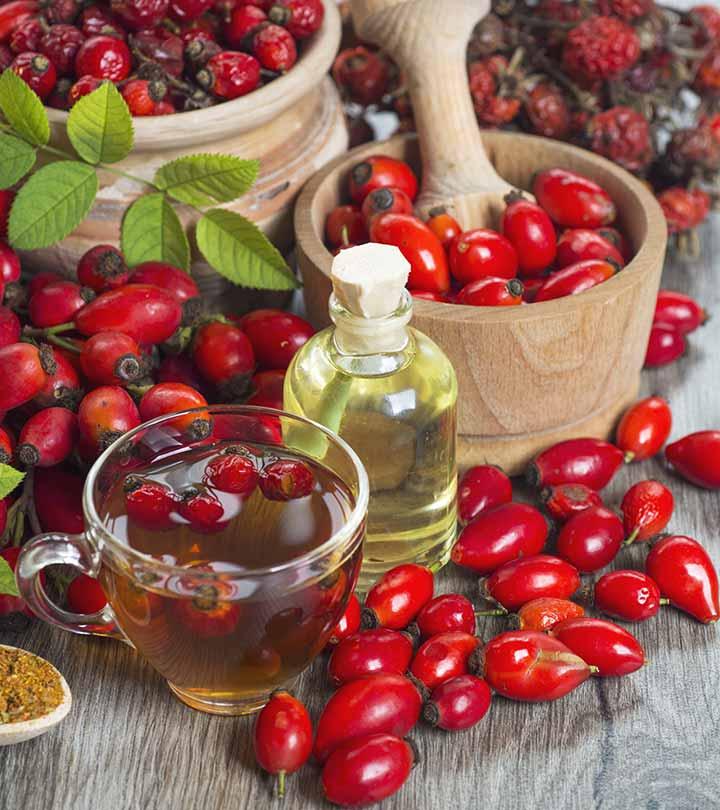
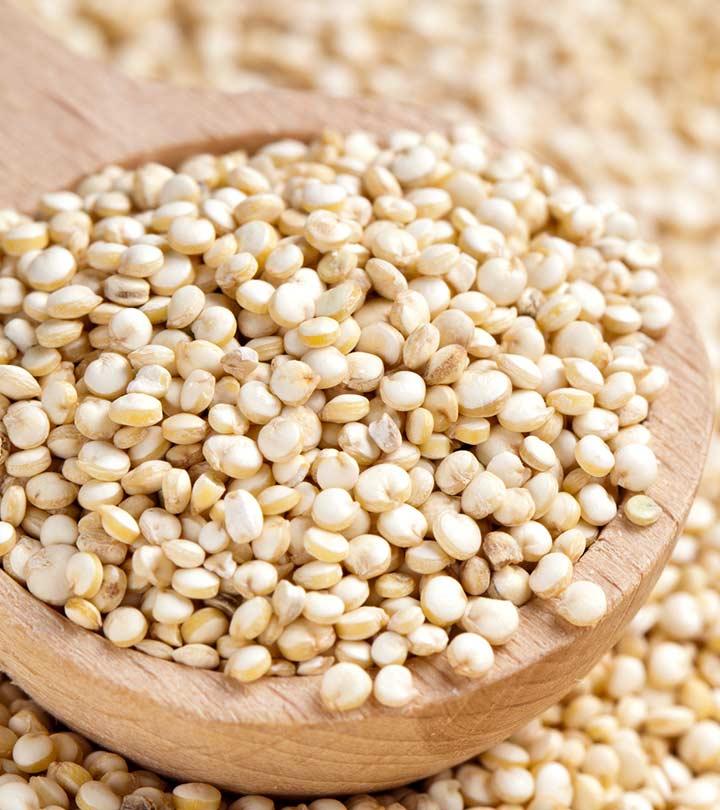
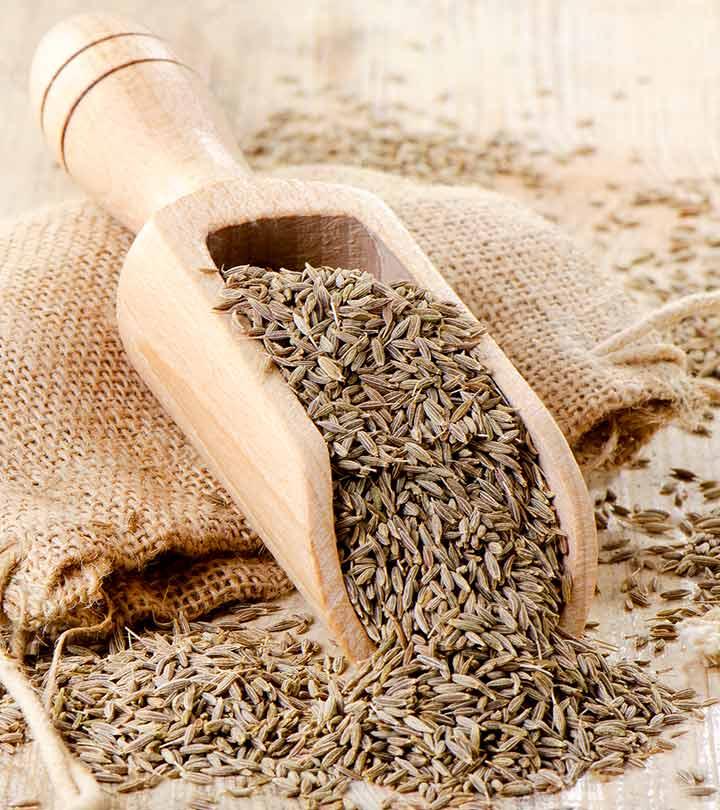
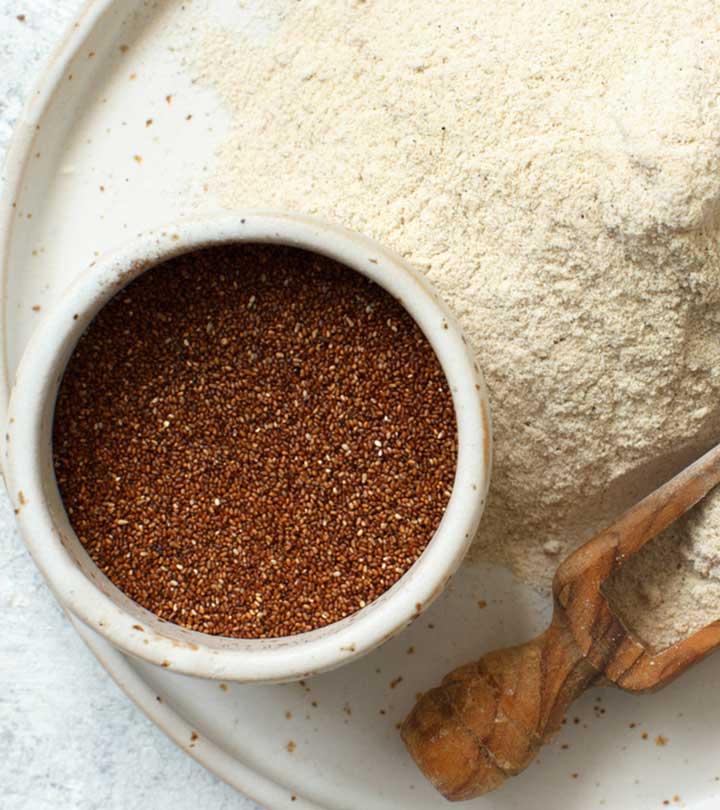


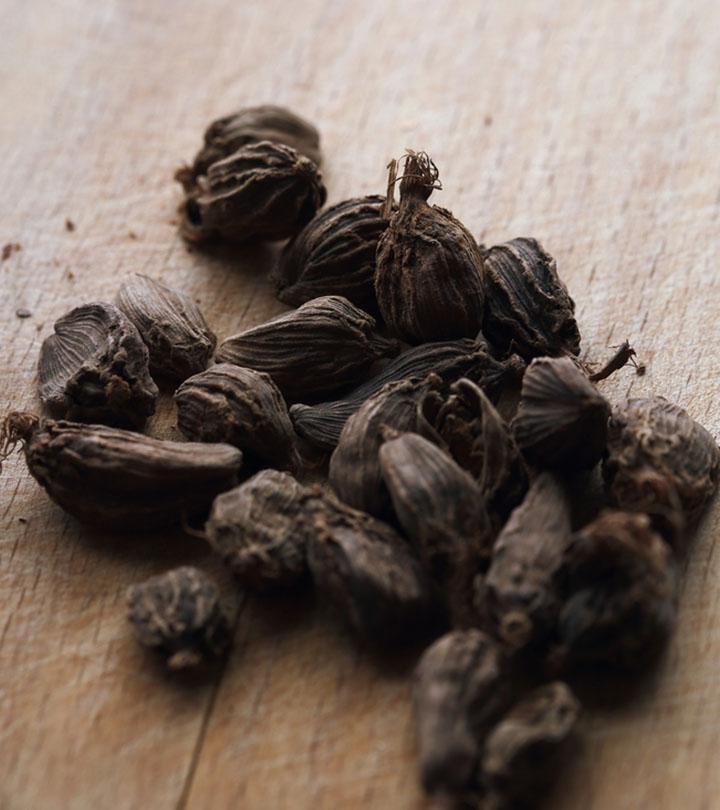
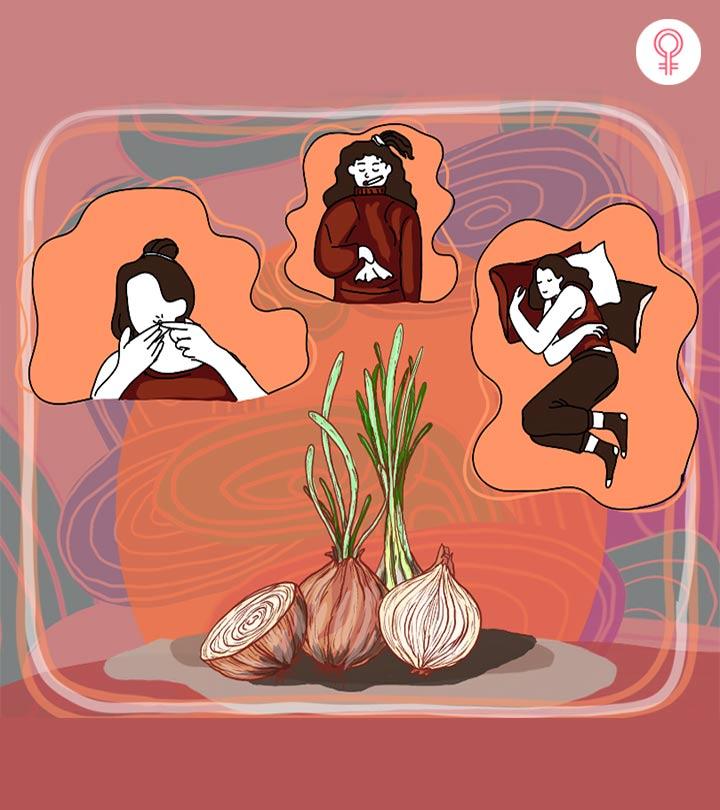
Community Experiences
Join the conversation and become a part of our empowering community! Share your stories, experiences, and insights to connect with other beauty, lifestyle, and health enthusiasts.